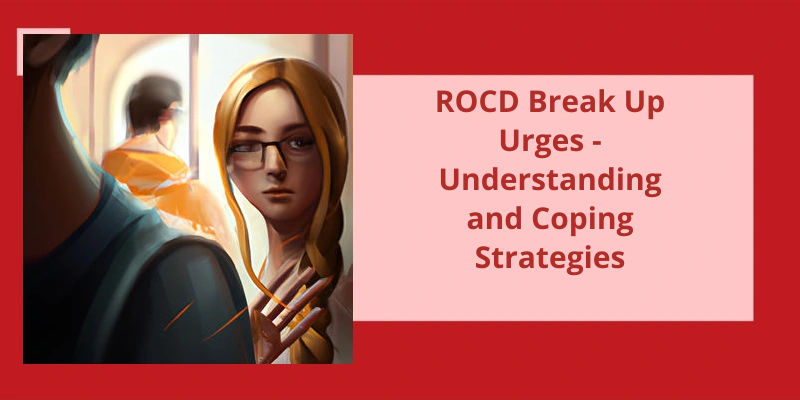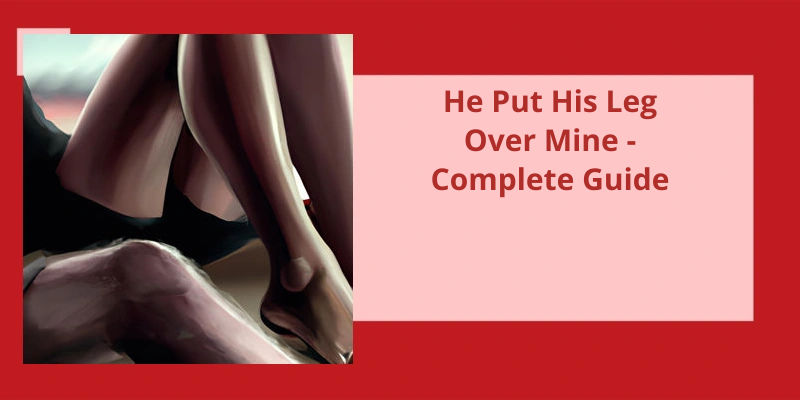Relationships are complex and dynamic, and they can be an overwhelming experience for some people. One of the issues that arise in many relationships is the feeling of anxiousness or obsessions, which can lead to an urge to break up with your partner. This condition is commonly known as ROCD (Relationship Obsessive-Compulsive Disorder). Individuals with ROCD experience intense doubts about their relationships and may have a frequent need to confess their attraction to other people. They may have an urgent urge to end their relationship, especially when they feel overwhelmed or anxious. The idea of love may even be a source of fear for people with ROCD. Unfortunately, the urge to break up or to confess feelings can be damaging to relationships. In this article, we will discuss this condition in detail and suggest ways for managing the urges that arise in relationships.
Do I Have ROCD or Relationship Anxiety?
ROCD, or relationship obsessive-compulsive disorder, is a type of anxiety disorder that can cause individuals to obsess over their romantic relationships in unhealthy ways. One of the key features of ROCD is the presence of intrusive thoughts and compulsions related to the relationship. These thoughts can be persistent, distressing, and difficult to control, leading to significant emotional distress and potentially impacting the quality of the relationship.
While ROCD is often grouped together with relationship anxiety, there are some important differences between the two. Relationship anxiety is a more generalized feeling of unease or uncertainty about the relationship, and it may be triggered by a variety of factors. These may manifest as worries about the partners flaws, doubts about compatibility, or obsessive thoughts about infidelity.
In order to diagnose ROCD, a mental health professional will typically conduct an assessment to evaluate the individuals symptoms and identify any underlying conditions that may be contributing to the anxiety. Treatment for ROCD often involves a combination of cognitive behavioral therapy, exposure therapy, and medication management. The goal of treatment is to help the individual develop more balanced and realistic thoughts about the relationship, as well as to reduce the compulsive behaviors that may be driving their anxiety.
If you’re experiencing intrusive thoughts or other symptoms related to your relationship, it’s important to seek support from a trained mental health professional. They can help you understand your symptoms and develop effective strategies for managing them, so that you can enjoy a happier, healthier relationship.
How to Differentiate Normal Relationship Worries From ROCD or Relationship Anxiety
- Examine the frequency of your intrusive thoughts
- Consider the intensity of your anxiety
- Reflect on your emotional response to the relationship
- Assess if your worries align with your core values
- Explore the impact on your daily life
- Seek guidance from a mental health professional if necessary
Understanding the fear of commitment in ROCD can be complex for both sufferers and their partners. While avoidance of relationship triggers may be a common behavior, there’s a deeper level of anxiety connected to the fear of being with the wrong person. In this article, we will explore the different ways in which ROCD can manifest as a fear of commitment and provide some insights for managing this fear.
What Is the Fear of Commitment in ROCD?
This fear can stem from past experiences of hurt and disappointment in relationships, causing the sufferer to be hesitant to fully invest in a new relationship. The fear of commitment in ROCD can also be related to the obsession with perfectionism and the need for everything to be just right. Sufferers may doubt whether their partner is the perfect match for them, or they may convince themselves that there’s someone better suited for them out there.
They may constantly debate whether they should stay in the relationship or break up, and may feel guilty for not being able to fully commit. This internal struggle can cause significant distress and impact the quality of the relationship.
It’s often rooted in past experiences of hurt and disappointment, as well as the obsession with perfectionism and a drive for everything to be “just right”. With proper treatment, sufferers can develop the tools necessary to overcome their fear of commitment and experience healthy, fulfilling relationships.
Strategies for Partners of ROCD Sufferers to Support Them Through the Fear of Commitment
- Offering emotional support and reassurance
- Encouraging open communication
- Attending couples therapy together
- Being patient and understanding
- Acknowledging and validating their fears
- Helping them set realistic goals
- Providing resources for self-help and education
- Avoiding pressuring them into commitment
- Showing them love and affection without expectation
- Encouraging individual therapy for the sufferer
It’s important to remember that ROCD doesn’t define you or your relationship, and with the right approach, you can still build a healthy and loving connection with your partner. With the help of a trained therapist, you can learn techniques to manage the intrusive thoughts and feelings associated with ROCD, allowing you to enjoy a fulfilling relationship and a happier, healthier life.
Can You Have a Healthy Relationship With ROCD?
Firstly, it’s essential to understand that having a healthy relationship with ROCD requires a lot of work and dedication. It isn’t a quick fix, but it’s possible with the right tools and support. Therapy, specifically ERP therapy, can help individuals with ROCD to learn how to accept uncertainty and reduce their dependence on compulsions.
Living with ROCD can be challenging, as individuals with this condition often experience intense anxiety and doubt about their relationships. However, with the right mindset and support, it’s possible to build a relationship that’s based on trust, love, and respect. Recognizing that ROCD is a disorder and not a reflection of reality can help individuals to separate their thoughts from their actions and behaviors.
It’s also important for partners of those with ROCD to understand the condition and be supportive, patient, and validating. This can include helping their partner to identify and challenge their negative thoughts and providing reassurance when necessary. Building a strong and understanding support system can help individuals with ROCD to feel less alone and better equipped to manage their symptoms.
In addition to therapy and support from loved ones, individuals with ROCD can also benefit from self-care practices such as exercise, mindfulness, and healthy eating habits. Taking care of oneself physically and mentally can help to reduce stress and anxiety and improve overall well-being.
Source: Relationship Moves to Avoid if You’re Living With ROCD | NOCD
Conclusion
In conclusion, relationships are complex and individuals experience a wide range of emotions and thoughts while in one. For some individuals with Relationship Obsessive-Compulsive Disorder (ROCD), the feeling of uncertainty and the need for perfection can be overwhelming and lead to feelings of anxiety. This can manifest in behaviors such as constant break up urges, confessing attraction to others, and avoiding expressions of love towards one's partner. It’s important for individuals struggling with these symptoms to seek professional help and support in navigating their relationship. It’s also important to recognize that ROCD break up urges and other symptoms don’t necessarily mean the end of the relationship, but rather an opportunity for growth and healing. With the right tools and resources, individuals with ROCD can learn to manage their symptoms and build healthy, fulfilling relationships.






